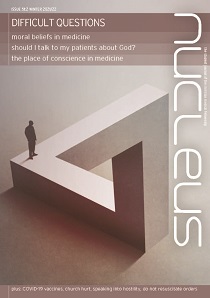'What you believe is harmful and has no place in healthcare!'
We may hear this statement, or at least variations of it, either explicitly or implicitly from classmates, lecturers or consultants. It can feel piercing and undermining, casting doubt over our core beliefs and values, which have often been the driving force behind us entering the healthcare space. How do we, as Christian healthcare students speak well into hostility like this? Do we confront, persuasively arguing for and standing boldly on our convictions? Do we just put up and shut up, hoping our actions will speak louder than words and quiet the incorrect assumptions about our faith?In this article we explore hostility and conflict and suggest ways we, as Christians in healthcare, can speak well into this.
what are hostility and conflict?
Hostility - unfriendly or aggressive behaviors towards people or ideas. [1] Conflict - a serious disagreement and argument about something important. [2]Social scientists have mapped out conflict on a continuum from low intensity to high intensity, a development on Game Theory's original win-lose model. In describing conflict within organisations, Patrick Lencioni proposes the following: [3] At the left end there is a state of no conflict, described as artificial harmony and defined by 'false smiling and disingenuous agreement'. The other end is 'relentless and nasty conflict' where people are 'constantly at one another's throats'.As you move from artificial harmony, you enter a zone of more and more constructive conflict, but there is a point of demarcation - the ideal conflict point where going beyond this becomes destructive. In reality, Lencioni thinks that most teams live somewhere near artificial harmony. As people engage in constructive conflict, they are fearful of reaching conflict Armageddon. They are happier sitting in a place of passive, indirect communication and artificial agreement, going out of their way to avoid direct, uncomfortable disagreement. No place more so, Lencioni suggests, than in the church. This happens because people confuse being nice with being kind:'Two people who trust and care about one another and are engaged in something important should feel compelled to disagree and sometimes passionately, when they see things differently. After all, the consequences of making bad decisions are great.'Lencioni's model helpfully acknowledges that a degree of conflict can be good. We see that within healthcare, where after discussions in which differing opinions and disagreements are heard, we make a way forward in the best interest of the patient.
why?
As you reflect on conflict and hostility in different areas of your own life and where your tendencies lie, have you ever thought why conflict and hostility exist? Can understanding this help us to speak into it well?a secular view
In his book, The Righteous Mind, Jewish atheist social psychologist Jonathan Haidt explores why seemingly good people are so divided over politics and religion. Core to his reasoning are the six moral tastebuds — sensory receptors within our moral mind. In the same way that we have different food preferences based on our tastes, we all have moral tastebuds that will shape our response to a particular moral cuisine/issue. These taste buds are: care/harm, fairness/cheating, justice/injustice, loyalty/betrayal, authority/subversion, sanctity/degradation, liberty/oppression. [4] You can read further about moral tastebuds in Laurence Crutchlow's January 2017 Nucleus article: How do we make moral decisions. [5] Loyalty/betrayal, for example relates to our need to belong to a group. It helps us form strong relationships and see beyond ourselves. It can also make us unnecessarily hateful to those outside our group. Or our taste for sanctity/degradation, the instinct we have to keep things pure and sacred, searching for things that are clean and protecting things from becoming dirty, will influence how we may view and respond to unborn children in beginning of life issues. We see these different tastebuds played out in many conflict situations. As a generalisation, Haidt sees the first, second and sixth buds listed as more prominent in current secular tastes and third, fourth and fifth prominent (but not necessarily to the exclusion of the others) in religious groups.a biblical view
This may go some way to explaining the roots of conflict and hostility but does it go far enough? Right from the early chapters of the Bible we see conflict and hostility — Cain and Abel, [6] Noah and Ham, [7] Sarah and Hagar. [8] Genesis 3 is helpful in exposing the ultimate heart of this — our rebellion against God. When human beings eat from the tree of the knowledge of good and evil, something cataclysmic happens, the universe breaks! Primarily, our relationship with God is broken but also our relationships with one another.Much of the conflict and hostility towards Christian beliefs finds its heart in our Genesis 3 actions — not wanting to acknowledge God for who he is, our creator; not wanting him to rule over our hearts, minds and lives; not wanting to worship him but rather worship created things. [9] Our response is to push back against him and his people. This latter part is also not surprising, as Jesus explicitly warns Christians that we 'will be hated by everyone'.[10]
Even as God's people, the universal brokenness in how we relate to one another means we are not immune from in group conflict and hostility. We see this with Paul and Barnabas in Acts 15 and their sharp disagreement that causes them to split. [11] Also Paul and Peter, [12] and Syntyche and Euodia. [13] Often, in our efforts to be faithful to God and follow him wholeheartedly, we can disagree with fellow brothers and sisters in Christ. In these situations, let's check our own hearts and motives; it is clear from Scripture that we are to seek unity within the church. [14]
Peter Saunders and Laurence Crutchlow helpfully explore disagreement among Christians further in previous Nucleus editions. 15,16 how do we speak into hostility well? Here are three top tips for speaking well into hostility and conflict in healthcare:
be quick to listen and slow to speak
How good are we at listening as healthcare students? A 2019 study showed that in encounters where clinicians elicited patients' concerns, they interrupted them on average eleven seconds later. We are encouraged in the Bible to be quick to listen, 1[7] to understand and not just to respond. [18] John Stott coined the term double-listening — listening and understanding God and the things of him but also listening and understanding the world. In doing so we are able to build a bridge between perspectives and worldviews that are different to ours. Take the time to think through and seek to understand the hot-topic areas and difficult questions we may face as Christians in healthcare — there is a wealth of resources on the CMF website (cmf.org.uk) to help you do this.In situations where conflict and even hostility have arisen, it can be easy to but in, to correct the other person or hammer home what we think or believe. The other part of James 1:19 encourages us to be slow to speak and we see similar wisdom over and over again in Proverbs. [19] We have to remember that we were all on the other side of the bridge at some point. God in his grace and mercy opened our blind eyes and showed us the truth of who he is. [20] Let's be prayerful, patient and listening as he does this for others too. [21]
speak the truth in love with grace
In John 1:14, we read of the Word becoming flesh — glorious Jesus coming to the earth from the Father. I have always found the juxtaposition of the glory of Jesus and him coming full of grace and truth interesting. Perhaps a way we reflect the glory of Jesus in conflict and hostility is by speaking the truth with grace. This can often be a hard balance to find. In our efforts to stand boldly and unashamedly for the truth of God and the gospel we can lack grace, [22] compassion, [23] and humility, [24] and be Bible-bashing clanging cymbals. [25] On the other side, for the sake of love and grace we can shy away from the truth, as Lencioni points out. A helpful barometer is to think — 'am I displaying the fruit of the spirit [26] and the characteristic of love [27] in this situation?' Unfortunately, I think we can forget that being right is not actually a fruit of the spirit and being dishonest is not a characteristic of love.accountability and community
Another way we speak well into hostility and conflict is to do it in community. A community to help us think through and discuss the issues and explore meaningful and wise ways to engage. In addition, accountability; someone you can pray with before and debrief with afterwards, someone that can encourage and rebuke you to be truthful, loving and gracious. As we reflect on areas of hostility and conflict within healthcare, local CMF groups can be a great space for this to happen. How about arranging a Christian medical discussion forum on a particular topic to explore further?a note on social media
These principles apply just as much to social media and the digital space as they do to face-to-face interactions. It can be easier with the anonymity a keyboard and screen provides to act in ways we just wouldn't if the person was there in front of us.final thoughts
There are many great examples of Christians, both in healthcare and without, engaging well in areas of hostility and conflict (see box above) and we can learn much from them. Although difficult, this is often part of the Christian life. Let's be ready with truth, boldness, love and grace as we live and speak for Jesus in healthcare.Rachel Owusu-Ankomah is CMF Head of Student Ministries
































